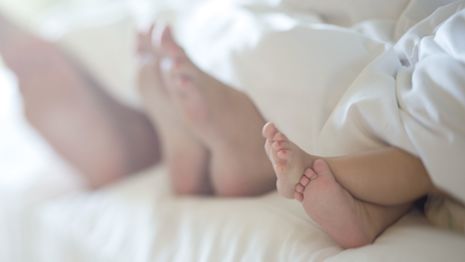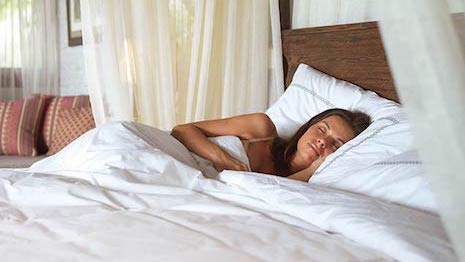Hotels can earn guests’ return business if they deliver an elevated sleeping experience, but a new report finds that only 42 percent of luxury hotel guests have had their expectations exceeded.
J.D. Power’s North America Hotel Guest Satisfaction Index Study found that 71 percent of guests who get a better than expected night’s sleep would stay again with the same brand. While luxury hotel brands often emphasize factors such as on-property amenities and service, setting guests up for a restful night can have one of the greatest impacts on their attitudes.
"Comfort of bed and other aspects related to sleep have always been important to guest satisfaction with their hotel experience, but in 2019 we redesigned the study to ask the questions a bit differently," said Jenni Corwin, senior manager of consumer insights for travel and hospitality intelligence at J.D. Power, Troy, MI.
"We’re now asking guests directly about their quality of sleep relative to their expectations, and there is a clear link to guest satisfaction related to this specific question," she said. "When guests receive a quality of sleep that is ‘better than expected’ they are far more satisfied than when they receive an ‘as expected’ quality of sleep."
J.D. Power’s report is based on a survey of almost 45,000 consumers who stayed at a hotel in the past year. Brand satisfaction is measured on a 1,000-point scale.
Sleep scores
A good night’s sleep can significantly raise guest satisfaction, boosting it by 114 points.
Quality rest can also increase the likelihood of return visits. Seventy-eight percent of consumers would come back to a property after experiencing elevated sleep, while 71 percent would be apt to book again with the same brand.
However, across all segments, only 29 percent of consumers say their expectations for sleep have been surpassed by hotels.
Luxury brands are the most successful at delivering sleep quality, with 42 percent of luxury travelers noting better than expected rest.
Some factors that can improve guests’ experiences include high quality linens, a comfortable bed and pillows and a quiet room. The temperature in the room can also have an effect on how restful a night is.
Hotels can also raise their satisfaction levels by going beyond the basics. Offering guests amenities such as robes and slippers and white noise machines can help guests get some shuteye.
Some luxury brands have rolled out amenities aimed at helping guests drift off comfortably when they are away from home.

Promotional image for Ritz-Carlton Dallas' Suite Sleep package. Image credit: The Ritz-Carlton
For instance, The Ritz-Carlton, Dallas is making guests’ sleep quality its top priority with a room package.
Suite Sleep is designed to help travelers get some shuteye, with eye masks, herbal tea, ear plugs, soothing music and a discount on a relaxing spa treatment (see story).
Fairmont Gold clientele at the Fairmont Royal York in Toronto have access to a sleep program, which helps them get a restful night through touches such as a pillow menu that includes lavender-scented and vegan options (see story).
In 2014, Four Seasons Hotels and Resorts teamed up with mattress manufacturer Simmons to bolster a dream-friendly reputation by introducing customizable beds into its portfolio.
The hotel chain enlisted research group Ipsos to gain a better understanding of consumers' sleep preferences and patterns. Thirty percent of former guests said they have requested a room change or taken other action when their hotel bed did not suit their needs (see story).
While sleep is important, it is just part of driving a positive experience.
"There is a delicate balance between attracting guests to a property or brand and ensuring they have a highly satisfying experience once they’ve made the choice to stay," Ms. Corwin said. "Many of the on-property amenities are critical to attracting guests and definitely impact satisfaction when they stay, so these things still need to be done in conjunction with a focus on sleep.
"In fact, guests who experience more at the property – spa, fitness centers, restaurants, etc. – often cite a ‘better than expected’ quality of sleep, provided the basics of a comfortable bed and quiet room are also met," she said.
Exceeding expectations
Along with sleep, another area where hotels can make or break the client experience is check-in. Consumers want expedited, friendly service that ideally takes about five minutes at most.
For those who are unhappy with their welcome, satisfaction scores drop by 100 points.
Luxury brands received an average score of 861 out of a possible 1,000.
In the luxury segment, The Ritz-Carlton topped the rankings for the fifth year in a row with a score of 881. Loews Hotels, Four Seasons, Park Hyatt and Fairmont rounded out the top five.
"Brands that perform well in guest satisfaction year after year, like The Ritz-Carlton, often delivery a very consistent experience, they market that experience well and attract guests that want what they are offering and are willing to pay a premium for it," Ms. Corwin said. "A consistent experience does not mean a cookie-cutter, one-size fits all experience, but rather a consistent level of service and personalization that creates a memorable guest experience."
{"ct":"pL\/GRMzw0QL7su\/833nD2zsGidT527KPqUqfdjjArRQo6IBGfwWUHDLe5DQdBVZ0mfne4u1HwODz4ZXlwZh+QVu5XX8DQeO7mNkGy+sJ+B3NeDhiJos5LApMdhKA6\/yPpWEhIINKqrQagdjdgU3uYya8EUMIxAb6Q12OYs0qA72H39z7V65IDFO36eCYF7H5+\/ZG6oimY0T3jLmsv1ziuOvHseCAl8JSlJHmp\/620QhZy8bg6VRUNd9d7AyDEttYevWSebFnSCVcuSDm7E6ryNIG4eCH8nVZhWVCTgfC3XtMad7Qw4kznBkJCqgQDAM413tdco2n6TQZNy7+acYqKtgalbOZIpr3lzcspmQbSHrKPBglxpHgcO767XTlupJWjJQin6fG7dX4VolpOlAMzvSoEgZWBn65UFwrbdFQ1oBNCbSymU\/S3WDF8fGeS5jL4VBUkpCsoex7+reObMk5rR1D1lpdrxhc3Bg3+P\/hYNwUOq\/pczC05fJT3QwcVC7i6YBlZYSS379v6Z3HcR+RL+63vDvvKt0aGszexavp73LipzF7VEcZo\/4UKW\/n8KsRNKqJcbAgHn6vK\/x138KZ5D6h6ExZsXgAARXUGyHy8legTIvnYrizVqkRxahZ+58Nm3kNwKPbYSuc56zZsKWh2hENg1wOwCkqnaSqLPvZP3af7HUHJ4cEwwGb\/Vdr1v3rtPnlr8pgE6k1oJ3PpyYemD0cc40ygBW+AtXl5pggMAm2ZLfv68vKkaXaTZxKYuFCfchc1lP\/eFUyNwyVZJdk89mmLojW17hVyKZTMEd1giTjJTCjuNAJlIf8St6JazS9SNDqOhxQ1Q0+MNBMM6E7pFW9sgWeQtEOv7eF+\/XF4hn0vHh\/5V5Txoc50+RywfmMEJrrX201QLlRBU484R5XtgXcqmQnxsyQYU65zePDD3MHRbRJqe21AiomDi+XorF17s5BXHRdiaEGbocb1XY1CaREGjdXgi3TsetO0g5LoLuFGssZcW50BzbAvyxXgbRW6doFPENOHV375+PGty1f0fnvJvo\/ofh5uI+WBpwBPPoo4+N2MXpvg5wseWcfhGT048EpeQs5zKv8baxDvN35dRU8R0xRMN93FoeY5yJgblVt2lD82cghwp\/E\/iciCPZsjorfsx6T4e+NfntmoTx6xKXuIG8Bc8Hf4SCkG76Q5GRkrgEfc\/aWQglDeYbUD6tM2YRzeJlvXGIWBDiQxOWpAfdtDS8pbLfYEXZp5BVVeB34fn0Y7IphP3ssA7CHaEfchQP1CMLYNAxi7R4FNA0+fKvtxCuiX\/3HtJytbCVajf6Jj0m82ULgxFVltV61dG6mUY7hnKaF\/HBrZzShkf9Yi3iWjgqB43iXOf40hK1qtXXjaphW8SzTZizJSVyc8Vh\/F6w8ijS2K3ajJEoFH0HxmWtovesex0vhu7AwVcc0GFE1Sp5oUES0OgNMgG7O4F3gs06XmzmdrGiYQkoxup9eynywnzsvOK4WqTfhVSs3cn2tsGi6HTEf0R2bHKB9RG+RvRLXT9uZ6PEWnn93K5tWVt89IapRcfeUZThcrQtIAsKlbPI\/u+9D0TB9rwTsHUgAr5TTZC4A7xTTjuxFGwWmbD0wzO36n48UWtAoJpTSoSMATcE1YoW1N7fvE76jucCHW6iB6\/ef46hiEcmt1VnTsXUEhRxI5ad\/Moc\/r7oza753mNBL4LM0r6REJr5wvNLQozEyBWZOWzE1HkA3GoPGfnWoX\/yHORxacfZDQK82+nUrkfu0\/V9XCVvMHOp3d4hpW7aVVJ+WtYpnun8vByWXRa66wIYOkLesaZbR59pSzhBUERvJP9n32lIAy4aOxGuNrZmTWjSLDggm\/o0xSsRs+W3nOOdL6X5ZqbeH+RI6T6ke0gBplIBt2R\/EOo2B9QKDhlcU4IhuKzAvVlZW52T8DB2+G7IibcjK0x5891LmLRDAK6sDmkBYjBOR\/NpDtUjxIxxWvFAq4ZB2WERgAoyyfEs9f89Jz8dFGenDHO1zMOvSPGlur\/SnZtzmx1CaH\/zcS8IpVy\/uynetddjPtzZ5vQk5ug4eAQsmORHefBTPP1x8\/DEzsehIAN4K+0hTsTyybCgNSdi8\/EEXDTXBiKg5u6u2nrDR8I3af+GJleHh2dnj68jh9LzdorArrJOMPLkTG806mZN6OILTBD4BYWOpAqJF1u0v\/nm1dwRbA\/kIHv+YGpZcmwH1dZYeKlVahfXtMIAori+fEFGBdP15buRseOYHc+oj0bxfArGZsuN97DQrnEps1uVv679N\/6HJgLL52LUe9\/i8gRsQieywsYrsaB8XN7cVQRAxmN7+RTNHb+ov4e64GAyUxj3pX60OFg6g7UWG9l\/cNkBzNsl7H+ZpSRSOJ3ljac0SmqdUIcbDY1YLi0U9jfBVdy+rGz8qAvlqWZHVYwGgeEwakvBvzN2ybIyfloqDJc3ve\/cgjaVdDu29zoW3pUL4LbrsIwn2KHvIlmZb43+ky8X6Nu6Q9Rya9JDDYEYja63U6CUwG+boCGGzgydcYnPsdTdebF1q8usnFL5DBPlJNl\/q\/j08nUMGQaBYD1rJWJkyukzmNdllU8Bn3ZQKPpkCratTO3T2C2eseKyH+4gP3gRq9ORgSXv\/swGSdIpZedc\/eq7fxiu5LvKQefU41WV1vVKJ8+0OTwifsGNj8sbyqkKVvQ028vvwULI3EONBXhIKirbJwlbblQPbmpi+qoVJjh6Vd4oL44a+TtiSVjV6mUcoZ+XIE7jAs8BkFK8bLFkSPPgjPX74knyrM3X8Fnc6rw5LapSZKQgE0YHlSNCXN+kTN2DxSzPbB1sl5bq4s0YzPQuqjpn7n4jkE9CjGAYFaah1JwMYOacWU+zYxvpATrXss3cIx1JQo7WD7Xy7Oc7zAMEOWlch1DnzqHZDp1PL3Us5E47NK783jQ0a6j6hdbdkIp3xykcw9LvYQm\/8yKW2kI3LG8ikM4XOMpruNvH+Wmb+cwGMPN\/Xg4Abx3ySPGupcqt4CPu+1seWTVCJTlHGss5X+julBRUcssG8DK1thki5k3d1GTZnB+rZlgqOYPb6p1vF6syuTqMVv7qfmtwEgpaODE+XuDSlYA882X2xhZqPnjR8exUJU+JCIOtzFu53JP3PMwwl7pc5kpWbFK\/9W63TcaffaO9HHfXNLWtwznca+qC9VU78jtUMJHXpx5VVwwrxABvMeOKl3yyfjUkSmhhHHepufbIjO6OK5dfRBi3ajGAlnRlfGt7VIYDLW95qgOzsXctKOKR4mzNA1GFHN+GLD\/c5NjxnPHkrCihyAjwL5\/whvfVSVmB2JdC\/ijnqcrpkD7eN+MsOwqz58fLrQMkEIRpO\/HRnxC\/gm9duk5b9mnsliFhlfcPUxXwYq9WJSqJPzk4yaraVjblOFN5fJFY7A4xjs36Yg71DK2Qi+U6RPjx6TdwFGPqjCjKvbAozX44E22IaE84Q\/4imxF0+lTsSaV8alvbtzf1I\/X5ux+uLsjHobqHdnVZhhA88lasnF9JTnoXbT8X5ly7tMZTr8KCwJxt2ZDcpHGjC4rWiAsU3OjPeLvsWLKkBI4NGcPsr5oAoKZd+yUIWpdvkPQobnT\/zOiXX84s+GbLR9Yz0bY3bYLhueQVjMWEZoIUDCPEWzBYbdgFPdM3JQrwz\/zEWnD\/YPZehw5\/ki\/16F5yYO2MisP6NzzYVk\/e4IyzzYVn\/5\/k7SnCJbK7ob6D++nPhjRf2FBKvCiUOtTc8MLXIIno2HZQraanlVE7zSbBfS\/EzklDfjF8BFghyFofZ980VK4Z4r37\/GyD0N7gHE5QpDbqvRwl85J2FB7hFtizYh+ALPWC1RDoY9tOLiOlhz8inge+oKGMxNvef8TxKUUY8+RLDtcTig3+XGUFO0s7F3bN+8+XGhxb\/8LQNxRyIKzJqip\/8sDzGlbTN+rLh4fRVw0I7DRYpSKkrFWErMH9BpANkmko\/WEy5Vkk3mi+0+i95r7y48LN8WstRe0WJMuz7vddSAfwtQOGC42wbvMVXL2COfyPyidQI5wgkYrWFSme2DpQnv03YRljKhYfz0aB1PdE5\/570oiSelzBIZQesyo4qJPDZbAGj5t8hEUaY6VbOxR3LIXzbL4cPwPsjzUZvQSVcKwq1WeaVhPhM2z6bHGFQDH6YlPq99\/Psr312\/oLim2OPIEuJZXnTQWivwzR0u97lMHwocaztnua+pXgjwzuusWBfzA5IkN7hL+57w+jJ0FvgNhJIbUuI84fI5Awk5e05tOffynF8c5kwCtsoj6Ez9Sm4taEncjvIMMT+9Ubvbi21jM5mtQa+qr7spELjtGkizDh2aTpoDaMViTWUqCT1wp2LzcKLfNOgi4aIeIRQF7JM7++Rs30BmTaH8qyARutfbxX\/diyfMT6XsTIsm1DM8eBePBxuIM0+wbL4hJxmhoKHJpFtjJsmTby+eQdEIlYckHlDzJw+XAjwPco47aoQO\/XrrvUULCnBiqTxRDgidK4G33hqTX34CXB459WEMq+sxM1yTsU9T2LKPFn7wSdHpAEIEOpot7mn7MUPsJiM7pio7zfoQN+ee7EFnqbFG4fmE7B8HVs72Vg92YWSDP7IZ3cRumscx0ugeXTwQOwp0hTCOr7D4UsyHVsULEe++QpaBfRybeA8GAYLwP+\/ZJHjzsTnO5PaHF\/NbOr2b\/rY50YrSqJ99JIZkA7\/6cUTYfuBPVOXIeI\/S3hkRQbA52mk3XgniMHywHZAIr9\/uMgy3bKEObmqnSYfLgiMQxJpyuo2dTfpP3Gz3arLTr0CFVDJfACCCo3ykNRwHv8Rg+IKjIrTsk7oMzXvAxDSTUQN2Pe98qZJYY9PI5BtdbzV4vP9GN1z+tBfftPoJflNr2LMQjrq3xg3GoDTLrZTKNjMbxbsvXODqNK2uWKe3j3J7\/dQ8SHx3N\/vZZhCf7L5JYirrl58+WHvh2B648BbFo6VU6jMwIR6gPIX282Ao5GmbyB\/V8iATkpqWoRbzbemrPKAlP6lwx3mqvC5cEtcUmI+zNMOg3xd6Q0L2qeVpNm0z\/\/GPn1UvMeZohopd+W\/DdvbanSiifAi1EzCVieeDKLeC021NVHtqrHSiN3xZp1DoMTR+nMj8vqA3p3qLZw25ds3dJG8TGEue4kEWOLq7\/U9h8s5s1r4y+q9r9kLki6UGy87Dyhj3M9zlHfo2LZ+h9jOPZaBQoCSdFFuFNnGSVxxlYSb3umiwA2+g6YlVEaIRkKriRHx02MDBdn5pdpYRXXr3yAcLAdZ49MbgmOyU4tlE1iKN92Z8eDtsXAxKL+j2N5qU\/D2OGD5YapesPKC+qxamgPLgFRBe1hVlekGNGQOATO4BxHIS3FjFx92rVM4G0K9+eHPOWCP\/FUPEE0Td2U6Fe3FugBcoPj2DoAMpBf3G\/jVrEVdVqRLqNJplJnNDO\/CUaLTi5B6VshySPwCuCLMoau1ZVEFOSYg5hdrM1UeO2nFs1vpQJPUcJPH3RE5coVbG6vRGdEkDd1puYtQdKl\/kEjRAr3qTvvYTPo2GmSNrwYRnVX30OVeu7P0TxwKZ6FgTJ1vGTW9d0WWZZPIJR5QrEeJUPp0vPsmFuiX8frwo\/S3Bd0mJNjoPAwBFjhNjkWYvR\/qA\/EMijdS6P+UgqQ0vvg34KQrJfmvqcdaNtJE6Xr32vRnElwqflNCrz80yveBx9roYWyfcUsD96qicu88YFFJPdrgGHJIznTqJFA80EkW0vtxyRfOgYi7S8l2xTJzz0afwq398a\/915YLNCIk2EL1N77mmnwF\/i3l5dadHb5QQT7gRQhM7xHuCIqcmraSsR9wvskq1q8X2IIdsBVLtKgkoOlis1vB3oG7HsQMx0W6Ti5Tv9lz4bRkUoRYpv\/71E6q730hmoS6lE4HuTn+MRexMRXjhDTZh8d0jpNPfzK2oNcO3w9+mbGf1PnEMymVsSnrP0pcsP3ACS4CzMa6q3Hii59cjxgUEHZmryp0kK5VVbkO76eShIAO4M7jET16qN8Y7wm6p32WZ3FvmMYQeEeFA0kgEMysLJbvrMkh2tI\/TD7mA9U0z52aksHW+WiUN+RL4LOqi++uC9scuH\/rDbS9rQ\/V6\/00bs+5IEcQ06rYpQWDqqMHvKC3onHsh6LFAM7BlDYgEAh0XV4EPJyGoKCsG8\/eDaEVZePkjqMRdyjbKlNQvY2i1TPz78a\/D7wLIhyJxu245\/fcJDktkAAqfWlgknu1aYJsfJYBBAirCvnRbM6oGNvEV1Cf0t8qDQUP12rD2tjAm2Go2pKnmr5xfYHeC1zYXZAhvWNl0NsdF+b1AVNR8dOUmrhGJRBp0tjOn7F4Sev9lN2YiXSC54fKyqfB9E9RO2HlO\/QXGb2sXm3kenttw6N20RlIg0QKkuPT1riJ9O8lP\/ZubW\/X9lAMo1NK7+Nob6ed1T7wuXmsTLVgcAxN9ilCFFIMEnu5m69pbqvG99GyPvaWLmsRptLV555wfy6213iHUUBs+m3ij1muGcqQMCE93SDPIS93ia\/miZzxxc6k8Oq+LUafbz7NvX+czWAjia6d3rvWG+TxHN\/Xh1\/gTRjrWpv+UUsnWUT4Z3NbDpK6n82ENd48C6cTr8oNJ6RA23+Cl8TWOCongPORg6Y+eaFV\/Iw068B0MWQnOT6oVDQSZ6dz5jM5vCO+\/CP2g22CSM884jS+gK3Iv2jm2qPMDgAxhlGm+dT0OwGSXw3\/R7u+Qex3BGzcLsgcFPHmp0YbfYADPCdwFVAW4k70oPMHr5Ae\/qmbr9F2edLdQufsSQNe0\/n8xwz5SMPSw\/8OFKXdrxcB4aDpvnoZSpYo7AGrgGYir06NyfGLG9VBANnHbecltAwsXdTSvC5CHq2svRaAnCOYQWuWLnhSZXPxxyF3vSWh1kUdNAdgW2CMdsGoRJX\/TOk4DYBTdt\/wuqtkgj87AY37q+2YpN31WjweKl2fdbSipmKaa2fW0K0g5HMirPPWogyxvZogpYcJeY8oXwK1OiFhWcDUofmzMtw5qwHTaxegZGNmPU1KCmq+MwXbY8youOsNygKzfvDbAewBK1hENwdDp7xO7kVlvjU1znF8aFVCwy\/fmk6hR0q4KdnaWhGtC8Asek9J+E1AJ+\/+u7y6PQkMXFiQnJfoC4EBcfWRYOUf1I0T8IDgKlyfzkYzhd8TpUux6BZjBt04TawDE6X46E3Gfq4ea90sMW2yj4Zzpb3LwGV74Cbq\/r+v0dWXKMyWm50RSJItMaiJ5TYDolVIt0IjZEWSX1sC7gVENZ2kctw2bpyU8Xt\/TejP0NjJRKNa59WHycNAfmEAuaFZk56CFefVtVXkAGiUzIiICSKhhQdo1wMVAS+3SMLMAQlusp7mQPxl1jSh7kC6vXncZfxKY\/ACgYl\/KFSQmWKH32IS\/khuRZtCfK+ic+\/8Z4jdWrxMAEhXJfHO8SXieHp1dWdr+jwUl\/xfZg7AjM+dvMZ36N95Cat9dsxW4Ux47TPaU4glaSSxq3MeNqE2sU0NhsCwkn9NLQDLLe\/f8SkRMkVa71oGCDRwsA4F1hEdKvI96utGbVZkk7kkyf2EiXt371UR0J1smI958O9SODVnlwXu9lfau2qmFqo6bGKlC3PMOK+XR2PS8bOSVz6UFP+9BvXC7ByMRDdTMcrYPa5n23eX1taiP11VfzFN9VBhjlBq03vXSS+HaznZjgN6yF3PcX2elJBMd7nEuQlMQS1wMS5xv06SculAb8aU4bsarzrqFfW00Yab9G0dnpoyK0PdL8hzSM25QPiqa6khjaxdJ1yty9liGP9NOxZdPN0pvuMIb3iXDTT+5+cy7npcAgdk+3lvo0uoxj5IIBmgu2Dgpf1Fddt4cRm6iiEEYkU4yEDCcLXEG20QVhipOwBGwbCBFh2nYrL8KXDMEL7Usawb0llFNtB81RhVsPAee+gsJcrmsggMbLw7gbrC8vburQNMJkfhJK8vuL0WpH\/DNBQq6MfZKesS7mrcYBabfWKDkPUhTW0W32sL7jD4lv1Mi+fh7kk4ITknB0QZ2HLUslhe1yBcHRpOlX8lJ9trowzlOcWTNfYLD4sT388gmgOcMfxCNZZ5UY\/BqIjAiiHovpYaJynSA46RT0SQ4h6MpAth4vnESegkaAMPt7+u8u\/z1n0CskehYes93VuY+LMDv2r+ZU3lY8opRcmDltN80h2UobDVOcRkeP5JK57Kf95c\/fZtZEBiEoJ8Juxm\/wAapZFcfwdndY6wz\/lYI\/W4O5irUd10wlFZtoCUuvgKBOBBkZTpJ2N7Fj0xuq59AjlXlhGSlxiBAwgLGs4ZSbB1MpAwWTc5hYoRm299c01lAtMnYw5BJ+rKshT7BxxV9XJAZSSAgsxC3pZ4XSMPL6e2rLTXSWgepVI8Kjb31eXF9DO17Ek49pWn6mprI135KjTRD3D815WU30ldc4QTAjDSeKe1I9LI3\/IIp9ZwbEK4yKga\/sylFke58kCTpfJx2Xl9iRTYciXsbXNOSiFNln6zPNWAHwcr60PrlZXqS+aqvlj2UbeVcy3i3zWh9x7Y+5+ijMfpj8+2yGjleQdx0LwVb5i0wRxcGOLkE\/S9bkFkpNCHehkVskOnpeSu8EI+e+fnHpxJXMoeh2Cbo2OxdvxQr5aYprgVUJc7QIzwtplsdQJ1OpG\/Aoljs0ToVUSFfm4ERvrKkA4YZfWt37FQgZWAgcSlBDbcryuS\/CmJA033Sm\/DjLJOigLxcic=","iv":"b90e423c5c5f547ba6a041ca0f65affc","s":"8b5e8b50ed3a4084"}

 Four Seasons has created customizable beds to help guests get a good night's sleep. Image credit: Four Seasons
Four Seasons has created customizable beds to help guests get a good night's sleep. Image credit: Four Seasons